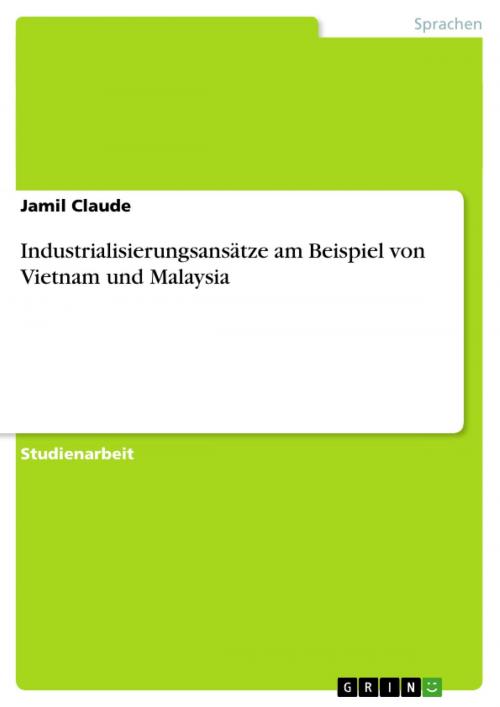Industrialisierungsansätze am Beispiel von Vietnam und Malaysia
Nonfiction, Social & Cultural Studies, Social Science, Cultural Studies, Ethnic Studies| Author: | Jamil Claude | ISBN: | 9783640634705 |
| Publisher: | GRIN Publishing | Publication: | June 1, 2010 |
| Imprint: | GRIN Publishing | Language: | German |
| Author: | Jamil Claude |
| ISBN: | 9783640634705 |
| Publisher: | GRIN Publishing |
| Publication: | June 1, 2010 |
| Imprint: | GRIN Publishing |
| Language: | German |
Studienarbeit aus dem Jahr 2003 im Fachbereich Südasienkunde, Südostasienkunde, Albert-Ludwigs-Universität Freiburg (Institut für Kulturgeographie), Veranstaltung: Südostasien, Sprache: Deutsch, Abstract: Während der zweiten Hälfte des 20. Jh. kam es zu der Entstehung eines dritten weltwirtschaftlichen Konzentrationsraums in SOA, innerhalb dessen auch Malaysia eine besondere Rolle zukommt. Während Malaysia zum Zeitpunkt seiner Unabhängigkeit im Jahre 1957 ein klassisches Beispiel eines Entwicklungslandes darstellte, dessen Industrie vornehm auf dem Export von Naturressourcen (Zinnbergbau [a] und Kautschukplantagen [b] entlang der Westküste; Anteil an den Exporterlösen (1957): [a] 25%; [b] 40%) aus dem sogenannten 'rubber and tin belt' gründete, konnte Malaysia im Zeitraum zwischen 1977 und 1995 für sich eine durchschnittliche jährliche Wachstumsrate von 8,3% verbuchen. Mit einem PKE von 3.890US$ (1995) gehört es heute zur Gruppe der Schwellenländer der 2. Generation, der 'Newly Industrializing Countries' (NIC). Die erzielten Fortschritte drücken sich z. B. in einer Reduzierung der Säuglingssterblichkeit von 45/1000 (1970) auf 12/1000 (1995), der Analphabetenrate von 40% (1975) auf 17% (1995) oder der Haushaltsausstattung (KFZ je 1.000 Einw. 1970: 65; 1995: 339) aus. (Kulke 1998:191). Das in Malaysia vorherrschende Politikmodell bezeichnet Johnson (1982) im Gegensatz zu dem in traditionellen Industrieländern praktizierten 'market-rational state' als 'plan-rational state'. Dabei zeichnet sich das 'plan-rational state' Politikmodell dadurch aus, dass '... the government will give greatest precedence to industrial policy, that is, to a concern with the structure of domestic industry and with promoting the structure that enhences the nation's international competitivness. The very existence of an industrial policy implies a strategic, or goal-oriented, approach to economy.' (Johnson 1982: 20; In: Wessel 1998: 165)
Studienarbeit aus dem Jahr 2003 im Fachbereich Südasienkunde, Südostasienkunde, Albert-Ludwigs-Universität Freiburg (Institut für Kulturgeographie), Veranstaltung: Südostasien, Sprache: Deutsch, Abstract: Während der zweiten Hälfte des 20. Jh. kam es zu der Entstehung eines dritten weltwirtschaftlichen Konzentrationsraums in SOA, innerhalb dessen auch Malaysia eine besondere Rolle zukommt. Während Malaysia zum Zeitpunkt seiner Unabhängigkeit im Jahre 1957 ein klassisches Beispiel eines Entwicklungslandes darstellte, dessen Industrie vornehm auf dem Export von Naturressourcen (Zinnbergbau [a] und Kautschukplantagen [b] entlang der Westküste; Anteil an den Exporterlösen (1957): [a] 25%; [b] 40%) aus dem sogenannten 'rubber and tin belt' gründete, konnte Malaysia im Zeitraum zwischen 1977 und 1995 für sich eine durchschnittliche jährliche Wachstumsrate von 8,3% verbuchen. Mit einem PKE von 3.890US$ (1995) gehört es heute zur Gruppe der Schwellenländer der 2. Generation, der 'Newly Industrializing Countries' (NIC). Die erzielten Fortschritte drücken sich z. B. in einer Reduzierung der Säuglingssterblichkeit von 45/1000 (1970) auf 12/1000 (1995), der Analphabetenrate von 40% (1975) auf 17% (1995) oder der Haushaltsausstattung (KFZ je 1.000 Einw. 1970: 65; 1995: 339) aus. (Kulke 1998:191). Das in Malaysia vorherrschende Politikmodell bezeichnet Johnson (1982) im Gegensatz zu dem in traditionellen Industrieländern praktizierten 'market-rational state' als 'plan-rational state'. Dabei zeichnet sich das 'plan-rational state' Politikmodell dadurch aus, dass '... the government will give greatest precedence to industrial policy, that is, to a concern with the structure of domestic industry and with promoting the structure that enhences the nation's international competitivness. The very existence of an industrial policy implies a strategic, or goal-oriented, approach to economy.' (Johnson 1982: 20; In: Wessel 1998: 165)















